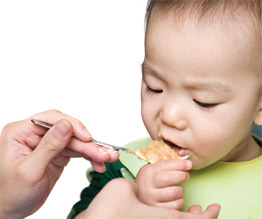Studies conducted in the United States have found that 50-60% of parents reported their children to have feeding difficulties. However, further research on the studies has concluded that out of the findings, only 25-35% of children have real feeding difficulties. There are probably many other factors that can affect the child’s appetite, but the overwhelming majority of parents seem to exemplify the working of the self-fulfilling prophecy.
For such parents, mealtimes are charged with anxiety which often shows up in the way they feed the child. The more the parent urges or tries to force the child into eating, the more likely the child will reject the idea of eating. Hence, it is important that parents should realise that there are many other factors which can affect the child’s appetite, and not just feeding difficulties.
So what are the common factors?
Oral-motor development – Effective eating depends greatly on the child’s readiness and adequacy in oral-motor skills such as sucking, biting and chewing. Parents need to be aware of this developmental milestone to avoid difficulties during feeding.
Fear of new foods – Also known as neophobia, this developmental stage of rejecting new or novel foods is common for children between two and three years of age. If this is not managed well, the child may further show signs of distress and anxiety towards a new food.
Environmental factors – Chaotic work schedules of parents and cultural beliefs of eating are some of the environmental factors that can significantly influence the eating patterns of the child. For example, unpredictable mealtime schedules may create inconsistent eating habits.
Unfortunately, many parents are often quick to blame it on feeding difficulties the moment their child isn’t eating or does not meet the basic expectations of physical growth. This may affect how they react or behave during mealtimes which can compromise:
- The child’s eating behaviour. He or she may associate eating with being distressed as a result of stressful mealtimes.
- Parent and child relationship. The relationship between the parent and the child can be affected when both go into a nerve-wrecking, tug-of-war during stressful mealtimes.
- Growth and development. The child’s potential to grow and develop into a healthy and well-rounded individual is compromised if eating problems persist, as a result of forceful feeding.
|
To prevent all these from happening, the cycle of parental pressure during mealtimes should be broken. Instead of feeling anxious which could resort in forceful feeding techniques, you should:
|






Comments